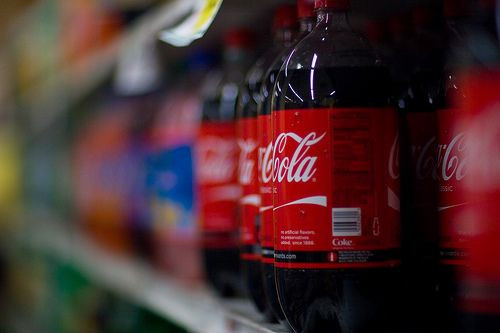18 Mayors Push To Ban Soda From Food Stamp Purchases, Would Join Cigarettes And Alcohol As Banned Items

Mayors from 18 cities across the country sent a letter to congressional leaders on Tuesday, requesting the government's attention in limiting food stamps' current ability to purchase sugary drinks and soda.
The mayors argue the purpose of food stamps is not for users to purchase unhealthy foods, in the same way they currently cannot purchase alcohol, cigarettes, hot food, household supplies, and vitamins — citing growing obesity rates and declining health as the impetus for their letter.
This is not the first time local government officials have attempted to ban sugary drinks from the food stamps program — formally called the Supplemental Nutrition Assistance Program.
In 2010, New York's then governor David Patterson, along with Mayor Michael Bloomberg, sought the U.S. Department of Agriculture's (USDA) approval in banning sugary drinks from food stamp purchases in New York. The agency, which runs the food stamp program, declined their proposal.
Mayor Bloomberg has since retained a spot in the news for his vehement, and so far unsuccessful, attempts to ban sugary drinks from certain food service establishments around New York City. Some critics cite the food stamp ban as an outlet from the city-wide ban. Mayor Bloomberg argues the nutrition aspect must agree with the program's intention.
"We need to find ways to strengthen the program and promote good nutrition while limiting the use of these resources for items with no nutritional value, like sugary drinks, that are actually harming the health of participants," Mayor Michael Bloomberg said in a statement, and whose office released Tuesday's letter. "Why should we continue supporting unhealthy purchases in the false name of nutrition assistance?"
The other cities whose mayors signed the letter include Baltimore; Boston; Louisville, Ky.; Madison, Wis.; Minneapolis; Newark, N.J.; Oakland, Calif.; Philadelphia; Phoenix; Portland, Ore.; Providence, R.I.; Salt Lake City; San Francisco; St. Louis; and Seattle.
The response to the mayors' letters has been mostly lukewarm. The USDA declined to comment, and the representatives for Republican House Speaker John Boehner and House Democratic leader Nancy Pelosi, to whom the letter was addressed, didn't immediately respond to requests for comment.
The American Beverage Association (ABA) replied with opposition to the mayors' proposed ban. The problem of obesity cannot be solved by severing one population from consuming sugary drinks, it claimed.
"Targeting struggling families who rely on [food stamps'] vital safety net will not make America healthier or reduce government spending," the association, which represents the non-alcoholic, refreshment beverage industry, told the Associated Press in an e-mail.
The AP also reports Bloomberg sent a congratulatory letter to Senate Agriculture Committee members praising them for a recent proposal, which would use two states as a litmus test for regulating the use of food stamps to buy healthy food and drinks.
Bloomberg's appeal to reconsider his sugary drink ban, which initially got shot down in September 2012, has been reopened and is awaiting decision from the court. Under the ban, restaurants and food service establishments who receive health inspections cannot serve sodas larger than 16 oz. Convenience stores and food carts do not fall under the ban.



























